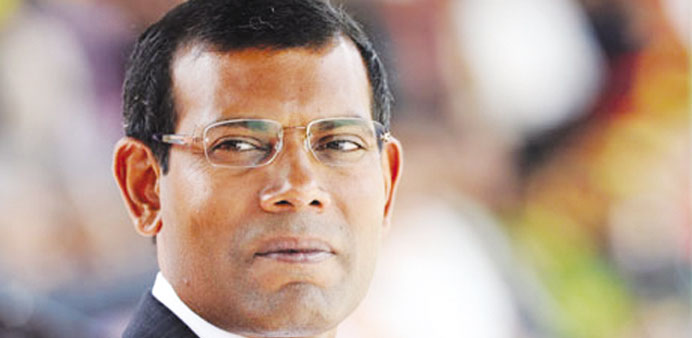Mohamed Nasheed: “Usually in a coup you kill the other man, but in this instance I remain an irritant to them.”
Bloomberg/New Delhi
The former president of the Maldives, who says he was ousted at gunpoint in a coup last year, predicts the country will be plunged into violence and political turmoil if he’s prevented from standing in elections.
Mohamed Nasheed was arrested this month while campaigning and said in a phone interview that he expects to be prevented from contesting the presidential ballot scheduled for September in the Maldives, an island chain in the Indian Ocean known for its luxury beach resorts.
“Usually in a coup you kill the other man, but in this instance I remain an irritant to them,” Nasheed, a former political prisoner who became the country’s first elected leader in 2008, said from the Maldivian capital, Male. “They need time to consolidate their position. They can’t consolidate if I am in the race,” he said referring to the leadership.
A power struggle in the Muslim nation may undermine the fight against piracy in busy shipping lanes that pass nearby, and bolster hardline Islamist political groups which have triggered concern in New Delhi and Washington.
“If Nasheed is prevented from standing, there will definitely be a law and order situation,” said S Chandrasekharan, director of the South Asia Analysis Group, based in New Delhi, adding that Nasheed’s party still had widespread support. “It will be very disturbing. There will be lots of violence.”
Nasheed left office in February 2012 after he ordered the arrest of chief judge Abdulla Mohamed, accusing him of failing to act impartially. Nasheed, who says he quit amid threats of violence by rebellious police and soldiers that amounted to a coup, is now on trial on charges of abuse of power relating the incident.
Masood Imad, a spokesman for President Mohammed Waheed, Nasheed’s former deputy who succeeded him, said he wanted to “make it clear to the world that the judiciary in the Maldives is not controlled by the government. It used to be controlled by the government in the past,” he said. “But now it is free to do whatever it likes.”
Nasheed, leader of the Maldivian Democratic Party, won the 2008 election, ending Maumoon Abdul Gayoom’s 30 years in power. Gayoom became president in November 1978 and held office for six consecutive terms in elections in which he was the only candidate. Concerned for his safety, Nasheed sought refuge at the Indian High Commission in Male for 10 days last month. He was arrested two weeks later and is next due in court on April 4 in a trial that he says is politically motivated and aimed at preventing him from winning office.
The European Union said last week it would be difficult to consider the Maldives elections credible unless Nasheed is free to contest and campaign. The US wants to see “transparent and inclusive” elections in the Maldives in which all participating parties are allowed to put forward candidates of their choice, State Department spokeswoman Victoria Nuland said in a February 13 statement.
Nasheed criticised the international community for their reaction to events in the Maldives. He said governments were content to work with the current administration rather than standing up for democracy.
“It is really quite shocking they so rapidly accepted the coup government and now they are finding themselves let down by them,” Nasheed said. “There is a feeling that it is finders, keepers - it doesn’t matter who is in power.”
Nasheed, a human rights campaigner, gained global attention for his activism on the issue of global warming during his time in office. He held a cabinet meeting underwater in diving gear to dramatise the threat posed to the low-lying Maldives by rising sea levels.
The Maldives, a group of 1,190 coral islands, located to the southwest of India, is visited by more than 750,000 tourists each year. The country has a population of about 400,000 people, most of whom are Muslim.

